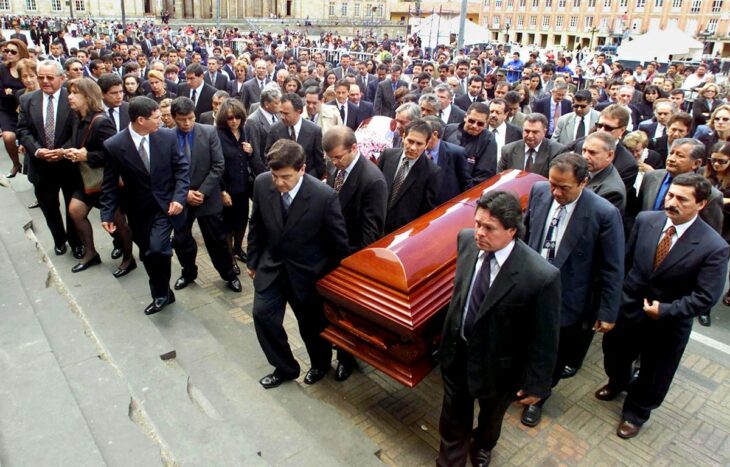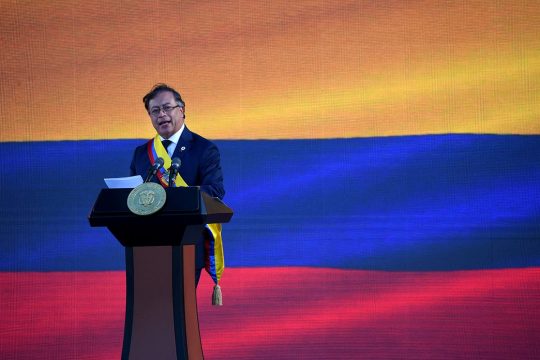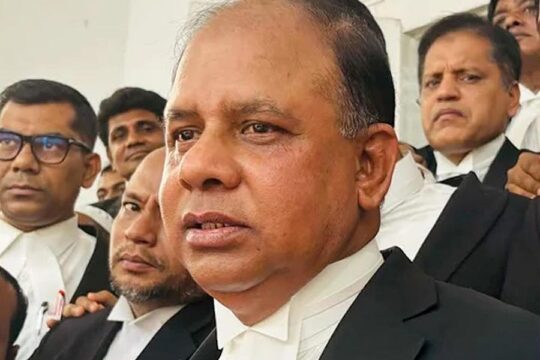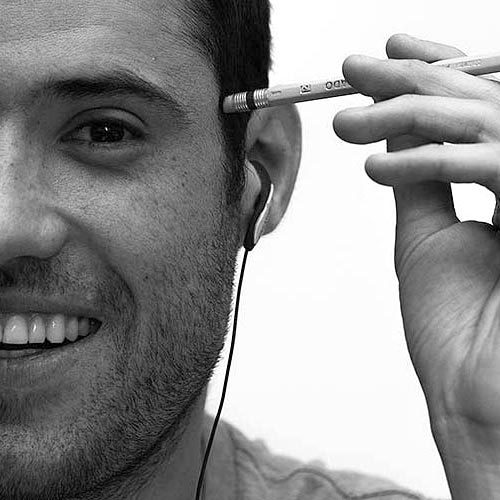On May 29, the Special Jurisdiction for Peace (JEP) unveiled its sixth indictment in five years of work and, more importantly, its first against a prominent politician in Colombia. It charged former congressman Luis Fernando Almario of co-authoring a "criminal plan to capture the State" in alliance with the former Revolutionary Armed Forces of Colombia (FARC), consisting in the extermination of his rival political group, led by the Turbay Cote family, in the Amazonian department of Caquetá. According to the indictment, both "designed a strategy to remove members of the Turbays’ group from the political arena" through "the exercise of armed violence", since they "held the majority of popularly elected and bureaucratic positions".
That indictment represents several milestones for the special tribunal stemming from the 2016 peace agreement. On the one hand, it’s the first indictment presented by the JEP's Investigation and Accusation Unit, the body in charge of investigating those who choose not to comply with the Colombian transitional justice system's condition to acknowledge their responsibility, clarify the truth and redress their victims, in exchange for a more lenient punishment. Almario will be the first defendant to face an adversarial trial in the JEP and, if found guilty, will receive a more severe sentence of up to 20 years in prison.
It is also the first case in which the JEP indicts a prominent civilian, after two of its first indictments presented charges against former guerrilla commanders and three more against military officials. In one case it charged a civilian who helped military officers in Catatumbo commit extrajudicial executions, but he wasn’t a well-known person.
It’s also the first time in Colombia that a court accuses someone of committing the crime against humanity of persecution. In its indictment, the JEP prosecutor's office concluded that there was a systematic and generalized attack against members of the political group, in full knowledge that they were civilians, on account of them "representing a political option different from theirs".
The opening of the adversarial lane
So far, the majority of persons accused by the JEP of having committed war crimes and crimes against humanity - including seven members of the former FARC’s top circle and some 20 high-ranking army officials - have chosen to accept the charges brought against them by the JEP’s Recognition Chamber. This will allow them, if they continue to comply with the conditions of owning up to their crimes, providing truth and redressing their victims, to receive 5-to-8-year sentences in a non-prison setting. Only three military officers, including one general, have not accepted the charges and will head to the adversarial track.
The case against Luis Fernando Almario, who was one of Caquetá's most powerful politicians and held a seat in Congress without interruption between 1991 and 2010, is different. He voluntarily submitted to the JEP in 2020, as the Supreme Court - which had already sentenced him to 10 years in prison for his alliances with far-right paramilitaries - was investigating him for his ties to FARC. However, in October 2021, the Recognition Chamber decided that Almario was not fulfilling his obligations and referred him to the JEP prosecutor's office. In May 2022, he attempted to withdraw his submission to avoid prosecution, but this was denied.
His case illustrates the difficulty that the judicial arm of Colombia's transitional justice system has with civilians. The peace agreement originally envisioned that the JEP would have jurisdiction over persons who had not been parties during the armed conflict, but the Constitutional Court severely restricted that power in 2017 and determined that only those who voluntarily submit can be investigated, effectively curtailing the special tribunal's ability to prosecute businessmen and politicians.
This is why Almario’s case is so interesting and novel: although it may end up being one of the few cases that the JEP brings against civilians and especially against politicians who helped commit atrocities, the JEP prosecutor’s office seized the opportunity to put together a kind of “mini macro-case” detailing a broader pattern of violence against an entire group of citizens and a joint plan seeking political control.
It’s also a milestone for a body known until now more for its scandals than its achievements, having seen one of its prosecutors convicted of corruption and having attempted to become financially and administratively independent from the JEP. It is still perceived as a loose cannon, to the point that upon unveiling its indictment against Almario, neither the JEP’s press team nor four of its justices consulted by Justice Info were familiar with the document.
A "criminal alliance" against Turbayism
For a decade Almario and the FARC forged what JEP prosecutors called a "criminal alliance" and a "delinquent agreement" seeking to "weaken the Turbays’ political movement and the consequent seizure of power" in Caquetá, a sparsely populated department the size of Hungary where the Andes meet the Amazon.
Following this plan, between June 1995 and December 2002 the guerrillas assassinated - in alliance with Almario - 20 persons linked to the political group known as Turbayism, forcibly displaced seven more and kidnapped three. Among them were all kinds of public officials, including two congressmen, a governor, a state assembly member, seven mayors and two municipal councilmen, as well as political sympathizers, bodyguards, drivers and journalists from the Turbay owned radio station.
The central target of these attacks was the Turbay Cote family, which dominated Caquetá politics since its patriarch, former congressman Hernando Turbay, led the creation of the department in 1981. Descendants of a Lebanese immigrant who settled there in the 1940s, they were relatives of former President Julio Cesar Turbay (1978-1982), well connected to national political elites, held sway over the Liberal Party at the regional level and adept at managing state resources. This allowed them to consolidate what JEP prosecutors dubbed "hegemonic control" over the state apparatus in Caquetá, dominating local elections and administrations thanks to their "network of patronage and friendships”.
The persecution began when Congressman Rodrigo Turbay, who had inherited leadership of the political group and was a member of the Peace Commission during failed peace talks with FARC in the 1980s, was kidnapped in June 1995 by 15 rebels after attending a farmers’ event on electrification in El Paujil. His body was found floating in the Caguán river two years later. His brother Diego, who returned from Belgium to take his place in Congress, was killed in December 2000 while traveling on the road between the state capital Florencia and Puerto Rico, in one of the most emblematic massacres committed by FARC. The guerrilla also murdered his mother Inés Cote, who had been a state assembly member and a respected leader in the region, as well as a driver, two bodyguards, a policeman and a family friend.
A similar fate befell several of their political allies and protégés. Governor Jesús Ángel González and his bodyguard Luis Eduardo Guzmán were assassinated in June 1996, when they arrived in a rural area of El Paujil with the expectation of securing the release of their mentor Rodrigo Turbay. That same night, in the remote town of Solano on the Caquetá River, rebels entered the house of mayor Demetrio Quintero and killed him while he watched television. In a sign of their merciless rampage against some towns, the FARC then assassinated the two acting mayors who took Quintero’s place, Edilberto Hidalgo and Edilberto Murillo, within eight months. Later, during the first three months of 2000, they killed Montañita mayor José Ibsen Fierro in his farm and Paujil council president Graciela Chiriví on her way home. The following year, they gunned down Puerto Rico mayor José Lizardo Rojas outside his home and in front of his wife. Just four months later, his successor Jhon William Lozano was assassinated in front of the mayor's office.
According to the indictment, "these crimes were not random, but part of a criminal plan" and occurred with "Luis Fernando Almario's knowledge".
The macabre spoils of war
The "criminal plan" between FARC and Almario to exterminate the Turbay family and their political group was advantageous for both. "They identified a common goal of seizing power in Caquetá, something they hadn’t been able to achieve individually. To this end, they combined their capacities," the accusation states.
For the guerrillas, who the JEP prosecutor's office points as "material executors" of the 30 crimes, it was profitable to get rid of critical public officials and ensure that those who took their place were their allies. According to the indictment, these murders were carried out by members of the FARC's 15th Front, 14th Front and Teofilo Forero Mobile Column. Almario, for his part, could take out his most competitive rivals and forcibly take over their positions.
Achieving this required a "division of labor”, the JEP argues. The FARC used its "armed capacity and territorial control" to attack Turbay-aligned politicians and allow like-minded candidates to campaign freely. Meanwhile, the Conservative Party congressman used "his status quo as a political leader in the region and his political machinery" to select candidates who could replace the Turbayism victims and provide them with endorsements from different political parties. In Puerto Rico, after the assassination of two mayors, an Almario ally who was brother-in-law of a rebel leader won. The tribunal described these two strategies - attacking Turbay-aligned politicians and co-opting the state apparatus - as two macro-criminal patterns.
The macabre strategy paid off: Turbayism was diluted politically until it didn’t field any candidates in the 2006 legislative and 2007 local elections, with its most visible members abandoning politics, the region or, in many cases, both. Some, such as former councilman Eduardo Ocasiones and Constanza Turbay, the only surviving member of her family, were forced to leave the country. Almario, meanwhile, went from controlling four town halls in 1994 to seven a decade later and increased his vote share in towns where he never had much of a political base, in what the JEP determined to be atypical voting patterns. In addition, nine allies - including his brother-in-law and two in-laws - accounted for two-thirds of the contracting of the public utilities company Electrificadora del Caquetá.
All of this led JEP prosecutors to conclude that Almario was the greatest beneficiary of the persecution of Turbayism. In their words, "he was aware that obtaining political control in the planned manner constituted an illegitimate and illegal end and that, in order to achieve it, violent actions were contemplated" and, in at least one case, he participated in "making decisions regarding the fate of Rodrigo Turbay".
"He would never have had the opportunity to beat him through strictly democratic and institutional channels," they concluded.
According to the indictment, Almario masterminded the criminal plan with two commanders of the FARC's Southern Bloc - Fabián Ramírez and Milton Toncel, better known as ‘Joaquín Gomez’ - and also maintained ties with two members of its top brass (‘Raúl Reyes’ and ‘Iván Márquez’). Surprisingly, unlike other JEP indictments, Almario's case includes almost no testimony from former rebels, raising the question of whether members of the organization are yet to provide substantial truth about these murders, as they are obliged to if they do not want to lose their legal benefits. One of them, Toncel, has already been indicted for thousands of kidnappings and accepted charges. Head prosecutor Giovanni Alvarez didn’t answer Justice Info's questions about whether his prosecutors spoke with Toncel and Ramírez, or whether it is his team’s strategy to demand that they shed light on these crimes.
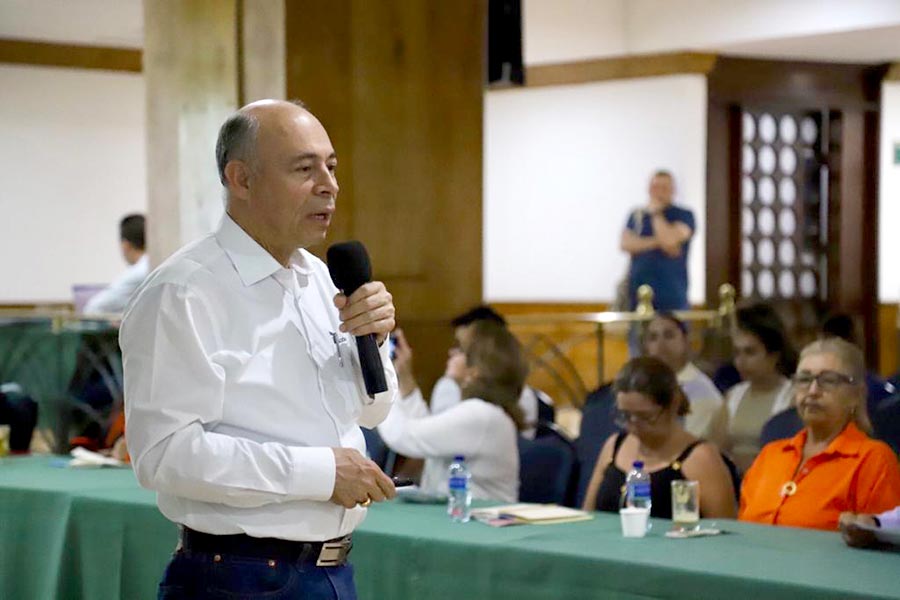
"A discursive path to dehumanization"
In one of its most novel sections, the JEP prosecutor's office studied the various hate messages disseminated against Turbay-aligned politicians and concluded that these sought to "give a semblance of legitimacy" to crimes later committed against them.
After compiling dozens of testimonies and messages from files in the Prosecutor's Office and courts, the Investigation and Accusation Unit established that this was a discursive strategy deployed through five types of messages. First, they promoted unsubstantiated prejudices that members of the Turbay group were corrupt, paramilitary sponsors or drug traffickers. For example, prior to their assassinations, FARC's Southern Bloc disseminated pamphlets accusing Rodrigo Turbay of being corrupt without evidence and did the same with Governor Jesús Ángel González in a communiqué. In addition, they circulated degrading messages describing them as ‘pigs’, ‘servile dogs’ or 'vulgar pushovers’ or pointing out that they were political obstacles for FARC.
Other messages sought to abuse them psychologically. In the days following the funeral of Diego Turbay and his mother Inés Cote, many attendees received threatening calls or visits. Journalist Octavio García, who worked for the Turbay family’s radio station Voice of the Jungle, was approached by two armed men who offered him their condolences and then told him that he too would be killed. Finally, the FARC levelled accusations against the Turbays at public events, including one in Remolinos del Caguán where they gathered 5,000 persons.
This "discursive path to dehumanization" sought, according to the JEP prosecutor’s office, to create the idea that they deserved to be punished and was "the preamble to the persecution”. With charts identifying messages against different Turbay-aligned politicians, the accusation proves that the 20 murders were preceded by such messages, to the point that they considered it as one of the criminal plan’s modus operandi, along with approaching victims on public roads or the frequent disfigurement of their faces.
Although these rumours were usually planted by FARC, JEP prosecutors also attributed responsibility for their genesis to Almario. According to their indictment, there is testimonial evidence that the then-congressman disseminated these prejudices, including in at least two meetings with rebel commanders like Hernán Darío Velásquez - better known by his nom de guerre 'El Paisa' - where he told them the Turbays were bringing paramilitaries to the region.
Rendering "invisible victims" visible
"Finally we see an emblematic case. I now feel reassured that justice will be served, even though it has taken a long time," says Amparo Calderón, a congressional official who endured the persecution against the Turbay group in her hometown of Puerto Rico for three decades.
Precisely one of the crimes attributed by the JEP to Almario is that of her brother-in-law José Lizardo Rojas, but the list of abuses against her family is encyclopaedic. Her brother Jorge Hernando, also a former mayor, was killed in 2009 and, though his case is mentioned in the indictment, it falls outside the time frame prioritized by the prosecuting team. Another brother, Alirio, suffered threats from FARC when he was mayor. She herself reports having been persecuted and threatened for years. Her sister Rubiela died of bladder cancer in 2012, an illness which Amparo attributes to the suffering caused by her husband’s murder and the multiple cattle rustling and extortions that followed. That rampage robbed her nephews of their family and has even driven them away from Colombia. "All because of a political bias," she says.
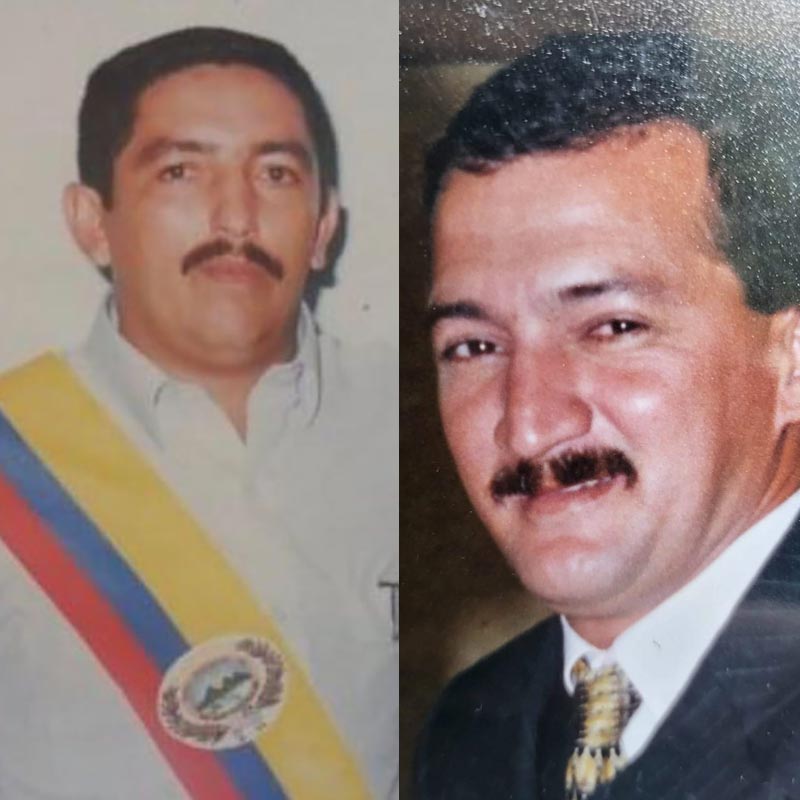
Her family's plight is just one example of a broader pattern of violence against politicians and public officials throughout Colombia. At the most local level alone, 582 mayors and councilmembers, as well as 202 candidates for these offices, were assassinated between 1986 and 2003. In addition, 747 mayors and councilmembers were kidnapped between 1970 and 2010.
This is why Amparo Calderón feels that the JEP prosecutor's office was right to turn it into a macro-case so that - in her words - "the political tragedy of the department is known". And above all, to clarify what happened to public officials who, as she says, were "invisible victims without political, economic and social clout".


